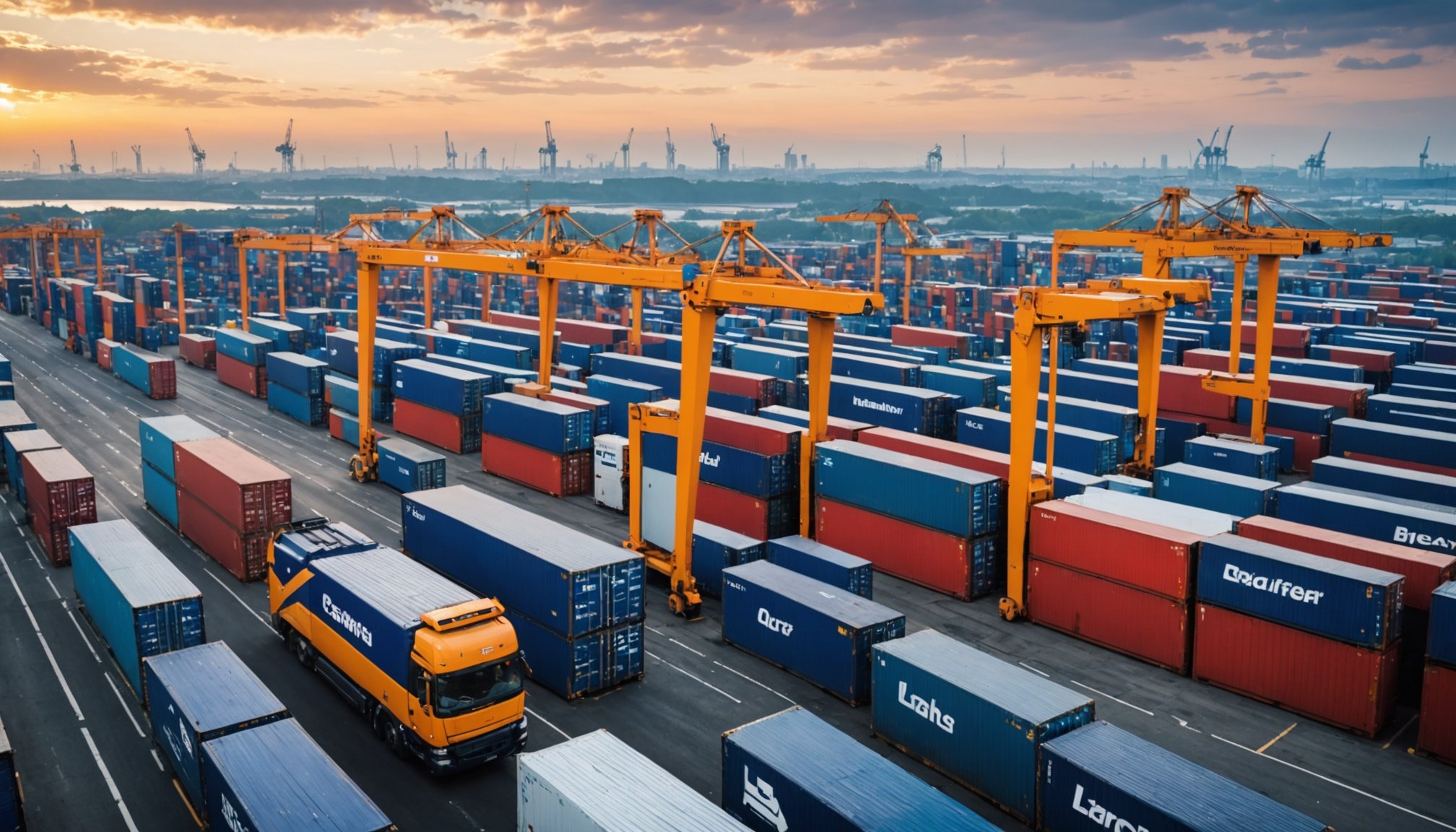Transforming UK Logistics: Harnessing Blockchain Innovations for Unprecedented Supply Chain Clarity
In the ever-evolving landscape of logistics, the UK is at the forefront of a revolution driven by cutting-edge technology. At the heart of this transformation is blockchain technology, a game-changer that is redefining the way supply chains operate. This article delves into the world of blockchain innovation, exploring how it enhances transparency, security, and efficiency in UK logistics.
The Role of Blockchain in Modernizing Logistics
Blockchain technology is more than just a buzzword; it is a robust solution that offers a secure, transparent, and efficient way to manage supply chains. At its core, blockchain is a decentralized, distributed ledger that records transactions in a manner that makes them virtually immutable and tamper-proof. This feature is particularly valuable in logistics, where the integrity and transparency of data are crucial.
Also to discover : Revolutionizing UK Manufacturing: Leveraging IoT Innovations for Enhanced Operational Efficiency
“Blockchain is a secure digital ledger that permanently records transactions while offering transparency to all involved parties,” explains an industry expert. “It leverages cryptographic tools to ensure data integrity, providing a trusted platform for collaboration in real-time”[1].
In the UK, logistics companies are increasingly adopting blockchain to enhance transparency and security in their operations. For instance, blockchain can be used to track goods in real-time, ensuring that all stakeholders have access to the same information. This not only improves the efficiency of supply chain operations but also reduces the risk of fraud and errors.
Also to see : Transforming the Restaurant Experience: The Impact of Digital Menus on Customer Satisfaction in UK Dining
Enhancing Transparency and Security
One of the most significant benefits of blockchain technology in logistics is its ability to provide unparalleled transparency. Here are some ways blockchain achieves this:
- Real-Time Tracking: Blockchain allows for the real-time tracking of goods, enabling all stakeholders to monitor the movement of products throughout the supply chain. This feature is particularly useful in industries where timely delivery is critical.
- Smart Contracts: Smart contracts, which are self-executing contracts with the terms of the agreement written directly into lines of code, can automate various processes within the supply chain. These contracts ensure that all parties adhere to the agreed-upon terms, reducing the risk of disputes and errors[3].
- Immutable Records: The decentralized nature of blockchain ensures that all transactions are recorded in an immutable manner, making it impossible to alter or manipulate the data. This enhances trust among stakeholders and provides a clear audit trail.
Future Trends and Predictions
As the logistics industry continues to evolve, the role of blockchain technology is expected to become even more pivotal. Here are some future trends and predictions:
Autonomous Vehicles
The integration of blockchain with autonomous vehicles will further enhance the efficiency and security of logistics operations. Autonomous trucks and drones, for instance, can be managed and tracked using blockchain, reducing lead times and optimizing last-mile delivery[1].
Sustainable Logistics
Blockchain will play a crucial role in sustainable logistics by enabling the tracing of raw materials, ensuring ethical sourcing, and promoting eco-friendly practices. This aligns with the global push towards more responsible business practices. For example, companies like Unilever have implemented blockchain-based solutions to track the origin and quality of raw materials used in their products[2].
AI and ML Integration
The use of artificial intelligence (AI) and machine learning (ML) in conjunction with blockchain will continue to optimize routes, predict demand, and improve the overall efficiency of supply chain operations. This integration can help in forecasting future demand more accurately, streamlining warehouse operations, and enhancing customer satisfaction[4].
Practical Insights and Actionable Advice
For logistics companies looking to adopt blockchain technology, here are some practical insights and actionable advice:
- Start Small: Begin with a pilot project to test the feasibility and benefits of blockchain in your operations. This approach allows you to gauge the impact without committing to a full-scale implementation.
- Collaborate: Work with other stakeholders in the supply chain to ensure a unified and interoperable system. Collaboration is key to maximizing the benefits of blockchain.
- Invest in Training: Ensure that your team is well-trained in blockchain technology to maximize its benefits. Training programs can help in understanding the nuances of blockchain and its applications.
- Focus on Security: Implement robust security measures to protect your blockchain network from potential threats. Security is paramount in maintaining the integrity of the blockchain.
- Monitor and Adapt: Continuously monitor the performance of your blockchain system and adapt to any changes or challenges that arise. This proactive approach ensures that the system remains efficient and effective.
Case Studies and Use Cases
Several companies have already embraced blockchain technology to transform their supply chain operations. Here are a few notable examples:
Unilever and GreenToken
Unilever, a consumer products giant, implemented GreenToken by SAP, a blockchain-based supply chain traceability and chain-of-custody application. This solution allows companies to record and track facts about the raw materials they use in products, including information like where raw materials originate and specific production attributes[2].
Bunge and Deforestation-Free Products
Agribusiness giant Bunge teamed up with one of the world’s largest producers of animal feed to develop a blockchain technology for ensuring soy and other products are deforestation-free. This initiative involves tracing traceability data from the field to final customers and includes the possibility of future collaboration on other services like real-time data transfer and measuring the carbon footprint of traded volumes[2].
FashionChain for SMEs
In the fashion industry, blockchain-powered platforms like FashionChain are helping small and medium-sized enterprises (SMEs) overcome supply chain challenges. FashionChain, built on the Hyperledger Fabric framework, provides SMEs with tools to build credibility, optimize operations, and reduce costs, creating a foundation for long-term success[3].
Economic and Environmental Impact
The adoption of blockchain technology in logistics has significant economic and environmental implications.
Cost Reduction
Blockchain can help reduce costs associated with traditional supply chain processes. By automating transactions and reducing the need for intermediaries, blockchain can lower operational costs. Here is a comparison of traditional vs. blockchain-based supply chain costs:
| Aspect | Traditional Supply Chain | Blockchain-Based Supply Chain |
|---|---|---|
| Transaction Costs | High due to intermediaries | Low due to automation |
| Inventory Management | Manual, prone to errors | Automated, real-time tracking |
| Risk Management | High risk of fraud and errors | Low risk due to immutable records |
| Supply Chain Visibility | Limited | Real-time visibility |
Sustainability
Blockchain technology also plays a crucial role in promoting sustainability. By enabling the tracing of raw materials and ensuring ethical sourcing, blockchain helps businesses meet their environmental, social, and governance (ESG) goals. According to a 2023 Digital Trends in Supply Chain Survey by PWC, most executives agreed that their supply chain strategy and operations are important to executing their company’s ESG strategy[2].
Overcoming Challenges
While blockchain technology offers numerous benefits, there are also challenges to its adoption. Here are some of the key challenges and how they can be overcome:
- Integration Complexities: Integrating blockchain with existing systems can be complex. To overcome this, businesses should start with pilot projects and collaborate with other stakeholders to ensure a unified system.
- Data Security Concerns: Ensuring the security of the blockchain network is critical. Implementing robust security measures and continuously monitoring the system can help mitigate these concerns.
- Regulatory Frameworks: The regulatory landscape for blockchain is still evolving. Businesses should stay updated on regulatory changes and work closely with regulatory bodies to ensure compliance.
Blockchain technology is revolutionizing the logistics industry in the UK by enhancing transparency, security, and efficiency. As companies continue to adopt and integrate blockchain into their operations, the future of logistics looks promising. With its ability to provide real-time tracking, automate processes, and reduce costs, blockchain is set to become an indispensable tool for logistics companies.
“The future of supply chains lies in the convergence of blockchain, AI, sensors, and digital identities to create a fully digitized and transparent ecosystem. Businesses now have an opportunity to rethink traditional processes and embrace digital transformation,” says an industry expert[1].
By embracing blockchain technology, logistics companies in the UK can stay ahead in a rapidly changing market, ensuring they provide the most efficient, secure, and transparent services to their customers. As the world moves towards a more digital and sustainable future, blockchain stands at the forefront, ready to transform the way we manage supply chains.
Final Thoughts and Recommendations
For businesses considering the adoption of blockchain technology, here are some final thoughts and recommendations:
- Stay Informed: Keep abreast of the latest developments in blockchain technology and its applications in logistics.
- Collaborate: Work with other stakeholders and industry experts to ensure a smooth transition to blockchain-based systems.
- Focus on Long-Term Benefits: While the initial investment in blockchain may seem high, the long-term benefits in terms of cost reduction, increased efficiency, and enhanced transparency make it a worthwhile investment.
In conclusion, blockchain technology is not just a trend; it is a transformative force that is reshaping the logistics industry in the UK. By harnessing its power, businesses can achieve unprecedented supply chain clarity, driving towards a future that is more efficient, sustainable, and transparent.











